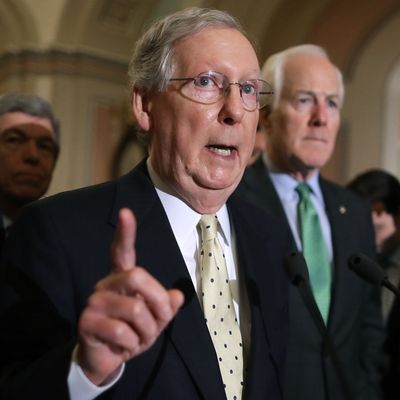
As Republicans fumble around in the dark trying to repeal the Affordable Care Act, the law has never been more well-liked. Poll after poll shows that Americans widely prefer Obamacare to the various sadistic plans Republicans have put forward to replace it. Until recently, the Affordable Care Act had struggled to gain widespread acceptance for a variety of reasons: nonstop scorched-earth opposition from the GOP; built-in American resistance to more government involvement in health care; a lackluster sales plan from President Obama and other Democrats; and the law’s actual shortcomings.
But once a Republican Congress and president possessed the power to actually destroy Obamacare, the party’s health-care hypocrisy was finally revealed for all to see. With its bumbling, bad-faith effort to take away health care from millions, the GOP has managed to do what Democrats never could — make the Affordable Care Act popular.
Meanwhile, the once-bedrock issue of Obamacare repeal has faded as a unifying plank among most of the GOP’s rank-and-file voters.
A New York Times article published on Friday offers a revealing glimpse into the minds of some average conservatives who once vehemently opposed the bill and now are lukewarm, at best, on the prospect of its destruction. For instance:
Five years ago, the Affordable Care Act had yet to begin its expansion of health insurance to millions of Americans, but Jeff Brahin was already stewing about it.
“It’s going to cost a fortune,” he said in an interview at the time.
This week, as Republican efforts to repeal the law known as Obamacare appeared all but dead, Mr. Brahin, a 58-year-old lawyer and self-described fiscal hawk, said his feelings had evolved.
“As much as I was against it,” he said, “at this point I’m against the repeal.”
“Now that you’ve insured an additional 20 million people, you can’t just take the insurance away from these people,” he added. “It’s just not the right thing to do.”
Another key vignette:
“I can’t even remember why I opposed it,” said Patrick Murphy, who owns Bagel Barrel, on a quaint and bustling street near Mr. Brahin’s law office here in Doylestown. He thought Democrats “jammed it down our throats,” and like Mr. Brahin, he worried about the growing deficit. But, he said, he has provided insurance for his own dozen or so employees since 1993.
“Everybody needs some sort of health insurance,” Mr. Murphy said. “They’re trying to repeal Obamacare but they don’t have anything in place.”
There’s more here than just the political truism that it’s almost impossible to take away an entitlement once it’s been bestowed. The reversal in public opinion cuts to the emptiness at the core of the national Republican agenda on this issue.
Ever since health-care legislation leapt to the front burner in 2009, Republicans have chosen to oppose the law in almost complete lockstep — not just as a policy difference, but as an affront to their sensibilities. (Several GOP governors have avoided this path, to their states’ benefit.)
As even enthusiastic supporters of Obamacare are happy to testify, the law has some significant problems, from too-high premiums to the too-limited selection of doctors and hospitals for many patients who buy insurance on the exchanges. (This is in large part because of the Republican opposition, which forced Democrats to create a system with a lot of moving parts.)
But most Republican lawmakers and officials have never engaged with such complications on the plane of reality. They pushed the fiction of “death panels,” brushed off complaints about the pre-Obamacare status quo by proclaiming that the American health-care system was the best in the world (a claim you don’t hear so much anymore), and then, once the law was in effect, moved on to other false narratives — for example, that the exchanges were perennially on the verge of imploding. They never dared admit the conservative roots of the Affordable Care Act, to the point that their 2012 presidential nominee, Mitt Romney, had to painfully contort his position on the matter after having passed an Obamacare-like law when he was the governor of Massachusetts.
Most important, they never grappled with the reality that the law has helped tens of millions of people.
The GOP was able to get away with their alternate-universe vision for so long because, without control of the three branches of government, it could revel in a series of symbolic repeal votes without offering an alternative.
Americans were also confused by the mechanisms of the Affordable Care Act when it was introduced, and indeed, the Times reports that many still don’t understand how the law works. This widespread perplexity created an opening for Republicans to claim vaguely that they could easily do better than the status quo — “something terrific,” in the words of Donald Trump.
But now, Republicans control every lever of the federal government, and any illusion that replacing Obamacare would be simple has been well and truly shattered. Instead, the relentless news coverage around health care has finally revealed Republicans’ philosophy on the issue: nothing more than knee-jerk opposition to the previous president combined with an overwhelming desire to cut taxes for wealthy Americans.
And by thus far rejecting any reasonable fixes to the law, the GOP has inadvertently helped drag the American public to the left. A recent Pew survey found that 60 percent of Americans now believe that government has a responsibility to ensure health care for its citizens, the highest number in a decade. That includes 52 percent of Republicans with family incomes below $30,000, up from 31 percent a year ago.
Propaganda works best when the enemy it conjures is hazy and easily caricatured; it works less well when everyday reality intrudes. Americans have now gotten a taste of what citizens in other industrialized nations have long become accustomed to, and they don’t want less of it. They want more.






























